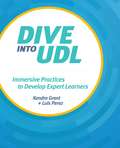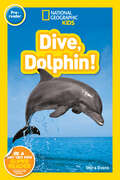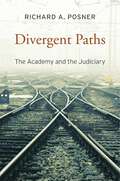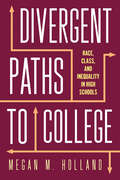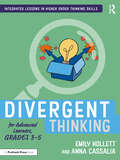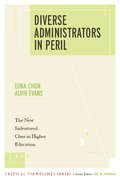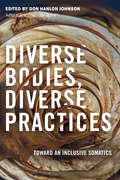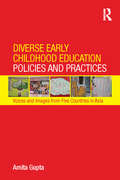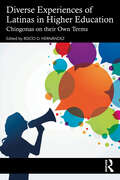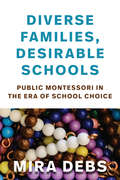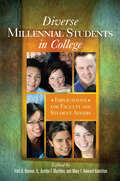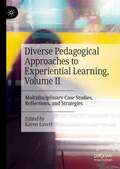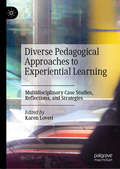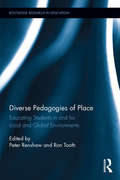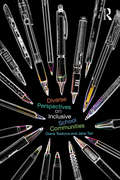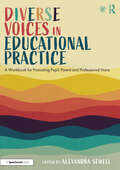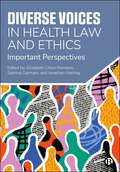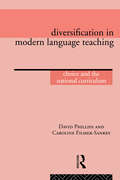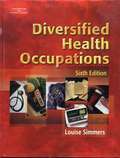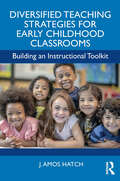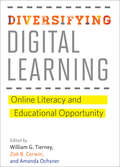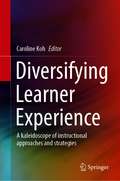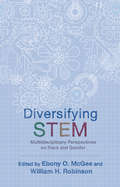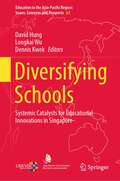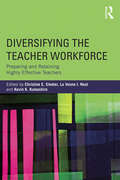- Table View
- List View
Dive Into UDL: Immersive Practices to Develop Expert Learners
by Kendra Grant Luis Perez<p>Universal Design for Learning (UDL) is a framework for designing instruction that meets the needs of every learner. This book provides an overview of UDL, showing how to offer flexibility in methods of presentation, student participation and expression to support high achievement for all students, including those with disabilities or limited English proficiency. Dive into UDL shows K-12 educators how to incorporate UDL in their instructional design and engage in continuous professional growth. The book will also appeal to those in coaching positions and to administrators seeking to support their staff. <p>The book: offers three modes of entry to allow educators to "start where they are" in their understanding of UDL and how it applies to their areas of instruction; shows educators how to enhance and transform their instructional practices by applying a UDL lens to analyze and redesign lessons; illustrates how to design accessible materials and use technology to provide more options for learners; and highlights how UDL is foundational to inquiry-based, project-based and constructivist hands-on learning.</p>
Dive, Dolphin! (National Geographic Kids Readers)
by Shira EvansFrom the classic bottlenose dolphin to the orca, young readers will learn all about these amazing animals in this pre-reader. Through text features such as the vocabulary tree and the wrap-up activity, kids will be introduced to vocabulary in concept groups—helping them make connections between words and expand their understanding of the world.
Divergent Paths
by Richard A. PosnerJudges and legal scholars talk past one another, if they have any conversation at all. Academics criticize judicial decisions in theoretical terms, which leads many judges to dismiss academic discourse as divorced from reality. Richard Posner reflects on the causes and consequences of this widening gap and what can be done to close it.
Divergent Paths to College: Race, Class, and Inequality in High Schools (Critical Issues in American Education)
by Megan M HollandIn Divergent Paths to College, Megan M. Holland examines how high schools structure different pathways that lead students to very different college destinations based on race and class. She finds that racial and class inequalities are reproduced through unequal access to key sources of information, even among students in the same school and even in schools with well-established college-going cultures. As the college application process becomes increasingly complex and high-stakes, social capital, or relationships with people who can provide information as well as support and guidance, becomes much more critical. Although much has been written about the college-bound experience, we know less about the role that social capital plays, and specifically how high schools can serve as organizational brokers of social ties. The relationships that high schools cultivate between students and higher education institutions by inviting college admissions officers into their schools to market to students, is a particularly critical, yet unexplored source of college information.
Divergent Thinking for Advanced Learners, Grades 3–5 (Integrated Lessons in Higher Order Thinking Skills)
by Emily Hollett Anna CassaliaDivergent Thinking for Advanced Learners, Grades 3–5 will develop students’ specific creative thinking skills. Divergent thinking is a skill which helps students approach problems with a flexible and open mind. Working through the lessons and handouts in this book, students will learn to examine problems from multiple perspectives and fluently generate varied solutions. This curriculum provides cohesive, scaffolded lessons to teach each targeted area of competency, followed by authentic application activities for students to then apply their newly developed skill set. This book can be used as a stand-alone gifted curriculum or as part of an integrated curriculum. Each lesson ties in both reading and metacognitive skills, making it easy for teachers to incorporate into a variety of contexts.
Diverse Administrators in Peril: The New Indentured Class in Higher Education
by Edna Chun Alvin EvansDiverse Administrators in Peril is the first in-depth examination of the work experiences of minority, female, and LGBT administrators in higher education. Written by two award-winning practitioners in higher education, this vivid and intensive study of American leadership from the inside out illuminates how the collision between everyday life and systems of power takes place in patterns of subtle discrimination. Based on scores of interviews with diverse administrators, the book examines patterns of racism, sexism, and heterosexism that persist in the highest administrative ranks and provides concrete strategies and models for inclusive leadership practices.
Diverse Bodies, Diverse Practices: Toward an Inclusive Somatics
by Don Hanlon JohnsonA cutting-edge anthology that opens the door for emergent voices from African American, Indigenous, Latin American, and Asian embodiment traditions to transform the field of somatics The notion of “body” that underlies most available writings about somatic theories and practices often assumes a universal normality of structure and function that has now come into question. In this collection, viewpoints grounded in neural, hormonal, gender, and physiological diversities challenge convention and open up a more inclusive world of somatics for psychotherapy and many forms of bodywork. The authors embody these differences and have developed their particular somatic practices out of direct experience. Their narratives offer new approaches to the transformation of our social order’s bodily roots enabling a healing of the recurrent traumas of the past. Covering topics such as the autistic body-mind, how the human body is both shaped by and shapes contemporary society, and somatic psychotherapy as a trustworthy resource for healing within the African American community, these poignant essays will help students and practitioners of somatics broaden the scope and efficacy of their therapeutic practices.
Diverse Early Childhood Education Policies and Practices: Voices and Images from Five Countries in Asia
by Amita GuptaDiverse Early Childhood Education Policies and Practices explores issues in early childhood education and teacher preparation in five Asian countries: India, Singapore, China, Sri Lanka, and the Maldives. Some observed classrooms in these countries reflect influences that are simultaneously indigenous and colonial, local and global. By highlighting the diverse and often hybrid classroom pedagogies at work in these 21st century Asian classrooms, the discussions in this book take into consideration the influence of globalization on local policies and practices, and the challenge educators face when they are expected to reconcile different and sometimes conflicting cultural and pedagogical world views. Through a research-driven analysis of key issues such as recent revisions to national early childhood education policies, perceptions on "play-based and child-centered" pedagogy, curriculum and learning materials, and an emphasis on the teaching of values, this book illuminates the diversity of the observed classrooms as well as current trends in early childhood education in parts of Asia. The cross-national perspective serves to expand and diversify the global discourse of early childhood education and teacher education.
Diverse Experiences of Latinas in Higher Education: Chingonas on their Own Terms
by Rocío D. HernándezBy sharing the collective experiences of Latinas in Higher Education, this book provides a diverse range of empowering testimonios from Chingonas living on their own terms, who are defining professionalism for themselves. Chingona means "badass" and is a term that has been reappropriated by Latinas as an expression of empowerment both inside and outside of education. This anthology is a collection of twelve voices, representative of the experiences of empowered Chingonas across various roles in higher education who identify as Latinas. This volume shares the knowledge of Chingona Latina women, including their thoughts around authenticity, identity, and the disruption of dominant cultural experiences within the institution. It also seeks to help other Latinas realize that they are not alone in their experiences with higher education. This book includes questions for reflection and writing prompts, allowing readers to consider their own lived experiences and envision change. This collection will be important reading for undergraduate and postgraduate students in education-related programs, including Higher Education Studies and Educational Leadership, as well as courses in Ethnic Studies, Chicana/o/x Studies, Latinx/a/o Studies and Women’s Studies. It also offers an invaluable learning opportunity for higher education professionals, leaders, and administrators, especially within student affairs.
Diverse Families, Desirable Schools: Public Montessori in the Era of School Choice
by Mira DebsIn Diverse Families, Desirable Schools, Mira Debs offers a richly detailed study of public Montessori schools, which make up the largest group of progressive schools in the public sector. As public Montessori schools expand rapidly as alternatives to traditional public schools, the story of these schools, Debs points out, is a microcosm of the broader conflicts around public school choice. Drawing on historical research, interviews with public Montessori educators, and ethnographic case studies, Debs explores the forces that pull intentionally diverse, progressive schools toward elitism. At the heart of Debs&’s book is a thoughtful analysis of the notion of &“fit&” between parents and schools—an idea that is central to school choice, which is often marketed as an opportunity for parents to find the perfect fit for their kids. By exploring parents&’ varied motivations in choosing these schools and observing how families experience—or fail to experience—a &“good fit&” after having chosen a particular school, Debs makes an original contribution to the literature on school choice and sheds light on the dilemmas entailed in maintaining diversity in progressive charter and magnet schools.
Diverse Millennial Students in College: Implications for Faculty and Student Affairs
by Mary F. Howard-Hamilton Fred A. Bonner Aretha F. MarbleyWhile many institutions have developed policies to address the myriad needs of Millennial college students and their parents, inherent in many of these initiatives is the underlying assumption that this student population is a homogeneous group. This book is significant because it addresses and explores the characteristics and experiences of Millennials from an array of perspectives, taking into account not only racial and ethnic identity but also cultural background, sexual orientation, and socioeconomic status differences—all factors contributing to how these students interface with academe.In providing a “voice” to “voiceless” populations of African American, Asian American, Bi/Multi-Racial, Latino, Native American, and LGBT millennial college students, this book engages with such questions as: Does the term “Millennial” apply to these under-represented students? What role does technology, pop culture, sexual orientation, and race politics play in the identity development for these populations? Do our current minority development theories apply to these groups? And, ultimately, are higher education institutions prepared to meet both the cultural and developmental needs of diverse minority groups of Millennial college students?” This book is addressed primarily to college and university administrators and faculty members who seek greater depth and understanding of the issues associated with diverse Millennial college student populations. This book informs readers about the ways in which this cohort differs from their majority counterparts to open a dialogue about how faculty members and administrators can meet their needs effectively both inside and outside the classroom. It will also be of value to student affairs personnel, students enrolled in graduate level courses in higher education and other social science courses that explore issues of college student development and diversity, particularly students planning to work with diverse Millennial college students in both clinical or practical work settings.Contributors: Rosie Maria Banda; Fred Bonner, II; Lonnie Booker, Jr.; Brian Brayboy; Mitchell Chang; Andrea Domingue; Tonya Driver; Alonzo M. Flowers; Gwen Dungy; Jami Grosser; Kandace Hinton; Mary Howard-Hamilton; Tom Jackson, Jr.; Aretha F. Marbley; Samuel Museus; Anna Ortiz; Tammie Preston-Cunningham; Nana Osei-Kofi; Kristen Renn; Petra Robinson; Genyne Royal; Victor Saenz; Rose Anna Santos; Mattyna Stephens; Terrell Strayhorn; Theresa Survillion; Nancy Jean Tubbs; Malia Villegas; Stephanie J. Waterman; Nick Zuniga.
Diverse Pedagogical Approaches to Experiential Learning, Volume II: Multidisciplinary Case Studies, Reflections, and Strategies
by Karen LovettThis second volume of Diverse Pedagogical Approaches to Experiential Learning (Palgrave, 2020) contains a new collection of experiential learning (EL) reflections, case studies, and strategies written by twenty-eight authors across sixteen academic disciplines. Like the first volume, the chapters describe the process of developing, implementing, facilitating, expanding, and assessing EL in courses, programs, and centers both locally and globally. The authors take on new themes in this collection, including discussions on the intersections of experiential learning with race and privilege, cross-cultural competencies, power and gender, professional development and vocational discernment, self-inquiry and reflection, social justice, and more. The authors also address the importance of adapting new pedagogical approaches to EL in response to challenges in higher education presented by the global coronavirus pandemic.
Diverse Pedagogical Approaches to Experiential Learning: Multidisciplinary Case Studies, Reflections, and Strategies
by Karen LovettThis edited collection offers a unique multidisciplinary perspective into the many factors that go into designing, facilitating, expanding, and assessing experiential learning (EL) from the perspective of faculty and staff educators. The editor and contributors bring decades of expertise with different forms of EL, including community-engaged learning, education abroad, internships, and more. Chapters offer case studies and reflections which highlight personal experiences and anecdotes which illuminate the realities of experiential teaching and learning. Through these stories and narratives, readers may better understand what doing EL entails on an everyday basis—both on a local and global scale—and learn how to enhance support and resources for experiential educators on college and university campuses.
Diverse Pedagogies of Place: Educating Students in and for Local and Global Environments (Routledge Research in Education)
by Peter Renshaw Ron ToothDiverse Pedagogies of Place presents eight original place-responsive pedagogies that address a question of paramount importance in today’s world: how do we educate the next generation of students to confront the challenges of global climate change and the on-going degradation of natural environments? Each place-responsive pedagogy is a result of innovative environmental educators’ long-term engagement with particular places, and demonstrates that personal connectedness is crucial to effective environmental education. Professional learning and teacher collaboration is an important theme throughout the book, and the editors discuss how teachers could adapt the learning activities and teaching strategies found in the book in order to create their own place-responsive pedagogies. Each case study provides a rich account of how students can learn to be attentive and draws upon a common analytical framework derived from recent theorisation of place that highlights the centrality of stories-in-place, embodiment, and contestation. The authors present detailed and persuasive evidence that place-responsive pedagogies enable students to construct their own identities, as well as develop commitments and a deeper knowledge of the environments that surround them. A work of international relevance, Diverse Pedagogies of Place will appeal to academics, researchers and postgraduate students in the fields of environmental education and sustainability, place-based education, outdoor learning, professional learning and teacher development, as well as policymakers and environmental educators.
Diverse Perspectives on Inclusive School Communities
by Diana Tsokova Jane TarrWhat is an inclusive school community? How do stakeholders perceive their roles and responsibilities towards inclusive school communities? How can school communities become more inclusive through engagement with individual perspectives? Diverse Perspectives on Inclusive School Communities captures and presents the voices of a wide range of stakeholders including young people and their parents, teachers, support staff, educational psychologists, social workers, health practitioners and volunteers in producing a collection of varied perspectives on inclusive education. In this fascinating book, Tsokova and Tarr uniquely assemble a compilation of accounts collected through in-depth interviews with over twenty-five participants, met throughout the course of their professional lives. The authors focus on how we can ensure all children receive the best education and social provision in inclusive school communities. Key learning points in this book emphasise: links between early life and educational experiences; constructions of inclusion; an understanding of roles and responsibilities; the power of agency in relation to inclusive school communities. The text contributes to current debates surrounding educational policy initiatives, highlighting similarities and differences across people and professions, and illuminating a way forward for the consideration of a broader range of insight into the concept of inclusion and ways this can be achieved. Including both UK and international perspectives that illustrate different stages of the inclusive education process, this text will be invaluable to anyone affiliated with inclusive schooling in a personal or professional capacity.
Diverse Voices in Educational Practice: A Workbook for Promoting Pupil, Parent and Professional Voice
by Alexandra SewellThis practical workbook supports teachers seeking to sensitively understand and respond to the opinions and perceptions of critical stakeholders in student learning and development; pupil voice, parent voice, and professional voice are introduced and explored. A wide range of expert educator and academic contributors ensure that diverse voices are meaningfully understood, with chapters placing an emphasis on minority and traditionally marginalised groups, including SEND, LGBTQIA+, and Global Majority students. The workbook advocates a clear and inclusive ethos and demonstrates how voice work can help to decolonise the curriculum, promote a positive LGBTQIA+ friendly school climate, and value pupil involvement. Moments for personal reflection, activities, and action plans allow practitioners to consider the role they play in facilitating the effective inclusion of those not normally involved in knowledge construction and decision-making processes. Blending key theory with practical strategies and takeaways, this workbook is an essential tool for practising primary and secondary teachers and teaching assistants, as well as educational psychologists, school counsellors, and other educational professionals interested in promoting inclusive voice practices.
Diverse Voices in Health Law and Ethics: Important Perspectives (Diverse Voices)
by Elizabeth Chloe Romanis, Sabrina Germain, and Jonathan HerringIlluminating the often-overlooked perspectives of marginalised groups, this essential textbook offers a transformative exploration of health law and ethics. Designed as a replacement for (or complement to) foundational health law texts, the book amplifies the voices of those frequently silenced in teaching materials: racialised communities, ethnic minorities, women, disabled individuals, LGBTQI+ people and those disadvantaged by socio-economic and structural factors. Chapters cover key topics such as abortion, medical negligence, and public health, scrutinising how traditional legal narratives can neglect the nuanced impacts on these diverse groups. Contributors challenge readers to reflect on the production and perpetuation of health inequalities, enriching the curriculum with critical viewpoints. Teaching tools include: - accessible summaries throughout the chapters; - critical reflection questions at the end of each chapter for students and teachers; - further reading lists and links to external resources.. This is an invaluable text that encourages students and academics to engage deeply with the intersections of law, health(care) and social justice. It is an indispensable companion for any health law course, fostering a more inclusive and well-rounded approach to legal and medical education and practice.
Diversification in Modern Language Teaching: Choice and the National Curriculum
by David Phillips Caroline Filmer-SankeyAs the effects of European integration become more widely felt the effective teaching of modern languages is moving towards the centre of the educational agenda and more and more schools are considering starting pupils on a first foreign language other than French - a development encouraged by the National Curriculum orders in Modern Languages. Diversification in Modern Language Teaching gives language teachers and heads of department the evidence upon which to decide if diversification is right for them. It looks at the factors which effect children's learning in this area and at the managerial issues both within and outside the school. Throughout it argues that the decision must be a purely educational one, based on pupil motivation and accessibility as well as on particular local strengths among staff and parents.
Diversified Health Occupations (6th edition)
by Louise SimmersThe first section of the book presents foundational information required to enter a broad range of health professions. The second provides fundamental entry-level skills by specific careers, including medical assisting, dental assisting, and more.
Diversified Teaching Strategies for Early Childhood Classrooms: Building an Instructional Toolkit
by J. Amos HatchThis book aims to broaden the teaching repertoires of pre-service and in-service early childhood teachers so they can better meet the needs of the children they teach. Covering 16 early childhood teaching strategies—ranging from traditional play-based approaches through direct teaching and technology-assisted instruction to postmodern methods—each chapter focuses on a different pedagogical approach, explaining what it is, why it’s important, and how it can be implemented in Pre-K–3 classrooms. Chapters conclude with detailed examples of how the strategies can be utilized to cover specific instructional objectives drawn from published standards. Diversified Teaching Strategies for Early Childhood Classrooms is essential reading for undergraduate students studying early childhood education, as well as graduate students, early childhood teacher educators, and any practicing Pre-K–Grade 3 teachers. It offers readers a richer set of tools for making good decisions about how to teach real content in ways that are effective and meet the needs of young children in a complex and rapidly changing world.
Diversifying Digital Learning: Online Literacy and Educational Opportunity (Tech.edu: A Hopkins Series on Education and Technology)
by Edited by William G. Tierney, Zoë B. Corwin, and Amanda OchsnerHow does the digital divide affect the teaching and learning of historically underrepresented students?Many schools and programs in low-income neighborhoods lack access to the technological resources, including equipment and Internet service, that those in middle- and upper-income neighborhoods have at their fingertips. This inequity creates a persistent digital divide—not a simple divide in access to technology per se, but a divide in both formal and informal digital literacy that further marginalizes youths from low-income, minoritized, and first-generation communities.Diversifying Digital Learning outlines the pervasive problems that exist with ensuring digital equity and identifies successful strategies to tackle the issue. Bringing together top scholars to discuss how digital equity in education might become a key goal in American education, this book is structured to provide a framework for understanding how historically underrepresented students most effectively engage with technology—and how institutions may help or hinder students’ ability to develop and capitalize on digital literacies.This book will appeal to readers who are well versed in the diverse uses of social media and technologies, as well as less technologically savvy educators and policy analysts in educational organizations such as schools, afterschool programs, colleges, and universities. Addressing the intersection of digital media, race/ethnicity, and socioeconomic class in a frank manner, the lessons within this compelling work will help educators enable students in grades K–12, as well as in postsecondary institutions, to participate in a rapidly changing world framed by shifting new media technologies.Contributors: Young Whan Choi, Zoë B. Corwin, Christina Evans, Julie Flapan, Joanna Goode, Erica Hodgin, Joseph Kahne, Suneal Kolluri, Lynette Kvasny, David J. Leonard, Jane Margolis, Crystle Martin, Safiya Umoja Noble, Amanda Ochsner, Fay Cobb Payton, Antar A. Tichavakunda, William G. Tierney, S. Craig Watkins
Diversifying Learner Experience: A kaleidoscope of instructional approaches and strategies
by Caroline KohThis book brings together strategies and innovations that educators from diverse educational contexts have conceptualized and implemented to cater to differences in academic ability, as well as in other domains such as psychosocial contexts and developmental needs. The emergence of IT and new technologies have altered the educational landscape and opened a multitude of opportunities for diverse modes of instruction catering to diverse student populations.The book addresses the gap in the literature with evidence-based reports of innovative strategies and approaches that are grounded in educational research. It identifies student differences in terms of academic ability and also, with regard to their cultural and social background, their developmental and psycho-emotional needs. It examines how new technologies are used in instructional approaches and how these innovative strategies diversify learner experiences. The book is a valuable resource to practitioners, researchers and educational administrators.
Diversifying STEM: Multidisciplinary Perspectives on Race and Gender
by H. Richard Milner Abiola Farinde-Wu Julius Davis Christopher C. Jett Kecia M. Thomas Ebony O. McGee William H. Robinson Lorenzo DuBois Baber Robbin Chapman Monica F Cox Krystal Madden Priscila Pereira Sara Rezvi Victoria F Trinder Danny Bernard Martin Jomo W Mutegi Dorinda J. Andrews Dara Naphan-Kingery Stacey Houston Gabriela León-Pérez Lindsay Brown Alissa M Manolescu Laura Provolt Aspen RobinsonResearch frequently neglects the important ways that race and gender intersect within the complex structural dynamics of STEM. Diversifying STEM fills this void, bringing together a wide array of perspectives and the voices of a number of multidisciplinary scholars. The essays cover three main areas: the widely-held ideology that science and mathematics are “value-free,” which promotes pedagogies of colorblindness in the classroom as well as an avoidance of discussions around using mathematics and science to promote social justice; how male and female students of color experience the intersection of racist and sexist structures that lead to general underrepresentation and marginalization; and recognizing that although there are no quick fixes, there exists evidence-based research suggesting concrete ways of doing a better job of including individuals of color in STEM. As a whole this volume will allow practitioners, teachers, students, faculty, and professionals to reimagine STEM across a variety of educational paradigms, perspectives, and disciplines, which is critical in finding solutions that broaden the participation of historically underrepresented groups within the STEM disciplines.
Diversifying Schools: Systemic Catalysts for Educational Innovations in Singapore (Education in the Asia-Pacific Region: Issues, Concerns and Prospects #61)
by David Hung Longkai Wu Dennis KwekThis book discusses the strategies that the Singapore Education System has embarked to encourage school change and innovations. It documents the change journey of Specialized Schools and Future Schools in Singapore with a view to understand the key tenets that enable school wide change and reform. The intents for change and reform are to anchor the education system to the basic foundations and principles of education and yet enable the system as a whole to be malleable to change and globalization. It shows how Singapore enables diversity within a structured environment through innovations in Specialized and Future Schools, and highlights the systemic rationale behind various efforts in Specialized and Future Schools and the kinds of adaptations schools have made to leverage structures and make adjustments for their contexts.
Diversifying the Teacher Workforce: Preparing and Retaining Highly Effective Teachers
by Kevin K. Kumashiro Christine E. Sleeter La Vonne NealDiversifying the Teacher Workforce critically examines efforts to diversify the teaching force and narrow the demographic gap between who teaches and who populates U.S. classrooms. While the demographic gap is often invoked to provide a needed rationale for preparing all teachers, and especially White teachers, to work with students of color, it is far less often invoked in an effort to examine why the teaching force remains predominantly White in the first place. Based on work the National Association for Multicultural Education is engaged in on this phenomenon, this edited collection brings together leading scholars to look closely at this problem. They examine why the teaching force is predominantly White from historical as well as contemporary perspectives, showcase and report available data on a variety of ways this problem is being tackled at the pre-service and teacher credentialing levels, and examine how a diverse and high-quality teaching force can be retained and thrive. This book is an essential resource for any educator interested in exploring race within the context of today’s urban schools.
